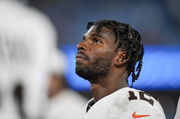

A Floridian gymnast stole the show in 2021 earning a perfect 10 in the NCAA. Despite juggling both elite and collegiate gymnastics, she outperformed Sunisa Lee, the Olympic winner to take the all-around title. However, the injuries forced her to retire early from elite gymnastics in May 2021. Meanwhile, the name-image-likeness deals were made available to student-athletes, like LSU gymnast Olivia Dunne, the highest-valued women’s college athlete with an estimated NIL valuation of over $3.3 million.
Watch What’s Trending Now!
Similarly, LeBron’s son, Bronny James is worth $5.9 million through NIL agreements while still playing basketball at college level. This week, a U.S. Senate hearing gave rise to an important discussion on the laws governing name, image, and likeness deals. Based on an update from the hearing, the former gymnast has taken a stand for all collegiate athletes.
ADVERTISEMENT
Gymnastics icon clears route on collegiate employment
College athletic executives advocated standard national rules governing name, image, and likeness (NIL) during their Tuesday testimony before the U.S. Senate. A total of five witnesses, including Trinity Thomas, a former US gymnast and accomplished gymnast from the University of Florida. Thomas, who receives NIL benefits, emphasized how students are frequently confused by the lack of consistency. A Twitter post by @JudiciaryDems showed her brief speech emphasizing on ?uniform standard to ensure we?re all playing by the same rules and eliminate confusion and unfair advantages.?
https://x.com/JudiciaryDems/status/1714316107635466502?s=20
Top Stories
Sources: John Harbaugh Wasn’t Fired, Left Ravens After Refusing Major Staff Changes

Andy Reid Fires Coach In Attempt to Rebuild Staff After Receiving HC Requests For Chiefs’ Coordinators

Three Arrested in Cleveland For Burglary at Shedeur Sanders’ Home

Mike McDaniel Contract: How Much Do Miami Dolphins Owe the Fired Coach?

Michael Jordan’s Bulls Teammate, Basketball Leagues Founder Dies at 68

Bill Cowher’s Strong Message to Steelers on Firing Mike Tomlin After HC’s Blunt Playoff Message

Thomas said, ?its a new and uncharted territory,? further complimenting its various merits up until now. However, drawing attention to its cons, she pointed out, ?there is currently no single standard that applies to all student-athletes in all sports.? Different states have different rules and regulations, which puts some students at a disadvantage. Finally, the gymnast concluded, “A federal law will also have the benefit of ensuring the future of the sport like gymnastics.”
ADVERTISEMENT
Leading figures like Big Ten Conference Commissioner Tony Petitti and President Charlie Baker of the National Collegiate Athletic Association also stressed the importance of a single NIL law. This would help resolve inconsistencies between state laws and protect student-athletes. The officials emphasized that high school and collegiate players may still benefit from a variety of options, including autographs, products, and affiliations, by earning money based on their own brand owing to the existing NIL guidelines in some areas. Now that the need for regulation has been raised, what are some of the other concerns?
ADVERTISEMENT
NIL conflicts listed by the senate attendees
Currently, 32 states have NIL laws in effect, creating a complicated regulatory environment for student-athletes to deal with. A number of the witnesses voiced concerns over the possible effects of employee status on students and college sporting programs. Interestingly, compared to Division I, schools in the NCAA Division II have smaller and less financially supported athletic departments.
Further, South Carolina Republican, Lindsey Graham, declared: ?If this committee and Commerce Committee doesn?t act in about a year, this thing is going to be an absolute mess, and you?re going to destroy college athletics as we know it.?
Making sure that student-athletes are not treated like employees is a major problem in order to protect their admissions eligibility and the chance to get an education that is equal to that of other students. Baker said, ?the first thing we really need to have more than anything, is some form of transparency around what people are actually getting.? Baker highlighted the lack of statistics on NIL participation that are available to the public as an example.
ADVERTISEMENT
Watch this story Struggling With Intense Training, America’s Crush Olivia Dunne Pays the Heavy Price
ADVERTISEMENT
ADVERTISEMENT
ADVERTISEMENT

